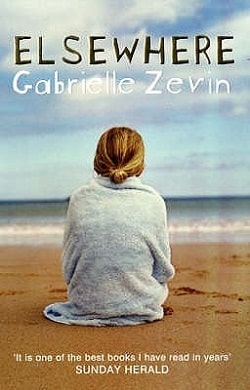Summary

Elsewhere
by Gabrielle Zevin
Welcome to Elsewhere. It is warm, with a breeze, and the beaches are marvelous. It's quiet and peaceful. You can't get sick or any older. Curious to see new paintings by Picasso? Swing by one of Elsewhere's museums. Need to talk to someone about your problems? Stop by Marilyn Monroe's psychiatric practice.
Elsewhere is where fifteen-year-old Liz Hall ends up, after she has died. It is a place so like Earth, yet completely different. Here Liz will age backward from the day of her death until she becomes a baby again and returns to Earth. But Liz wants to turn sixteen, not fourteen again. She wants to get her driver's license. She wants to graduate from high school and go to college. And now that she's dead, Liz is being forced to live a life she doesn't want with a grandmother she has only just met. And it is not going well. How can Liz let go of the only life she has ever known and embrace a new one? Is it possible that a life lived in reverse is no different from a life lived forward?
This moving, often funny book about grief, death, and loss will stay with the reader long after the last page is turned.
.
Read
Elsewhere on http://kissnovel.net
Martial Peak Reviews
Gabrielle Zevin's Elsewhere is a poignant exploration of life, death, and the complexities of growing up, all wrapped in a unique narrative that invites readers to ponder the very essence of existence. The novel introduces us to Liz Hall, a fifteen-year-old girl who finds herself in a liminal space after her untimely death. This afterlife, dubbed "Elsewhere," is a place that mirrors Earth in many ways but operates under its own set of rules, particularly the concept of aging backward. This intriguing premise sets the stage for a story that is both whimsical and deeply reflective.
One of the most compelling aspects of Elsewhere is its exploration of grief and acceptance. Liz's journey is not just about navigating her new reality but also about coming to terms with the life she has left behind. The narrative deftly captures the confusion and sorrow that accompany loss, particularly for a young person who has yet to fully experience life. As Liz interacts with other residents of Elsewhere, including her grandmother, she grapples with feelings of anger and frustration. This emotional turmoil is relatable and authentic, making Liz a character that readers can empathize with. Zevin's portrayal of Liz's internal struggle serves as a reminder that grief is not a linear process; it is messy, complicated, and often unpredictable.
The concept of aging backward is a fascinating narrative device that Zevin employs to challenge traditional notions of time and growth. In Elsewhere, Liz will eventually regress to infancy, a process that forces her to confront the idea of losing her identity and experiences. This backward aging serves as a metaphor for the desire to reclaim lost opportunities and the universal wish to hold onto youth. Liz's longing for milestones—like getting her driver's license and graduating high school—highlights the human tendency to cling to the familiar and the fear of letting go. Through this lens, Zevin invites readers to reflect on their own lives and the moments they cherish.
Character development is another strong suit of Elsewhere. Liz is surrounded by a cast of intriguing characters, each with their own stories and struggles. Her relationship with her grandmother, whom she has just met in this afterlife, is particularly poignant. Initially, Liz feels resentment towards her grandmother, who represents a life she never knew. However, as the story unfolds, their bond deepens, illustrating the importance of connection and understanding, even in the most unexpected circumstances. This relationship serves as a microcosm of the larger theme of finding solace in shared experiences, even in the face of death.
Zevin's writing is both lyrical and accessible, making the novel suitable for a wide range of readers. Her ability to blend humor with profound themes is commendable; moments of levity punctuate the narrative, providing a balance to the heavier topics of grief and loss. For instance, Liz's encounters with famous figures from history and pop culture, such as Marilyn Monroe, add a whimsical touch that keeps the tone from becoming overly somber. This clever juxtaposition of the fantastical and the real enhances the reading experience, allowing readers to engage with the material on multiple levels.
The thematic depth of Elsewhere invites comparisons to other works that tackle similar subjects. For instance, readers may find echoes of The Lovely Bones by Alice Sebold, which also explores the afterlife through the eyes of a young girl. However, while Sebold's narrative is steeped in tragedy, Zevin's approach is more nuanced, blending humor and hope with the weight of loss. Similarly, Bridge to Terabithia by Katherine Paterson touches on themes of friendship and mortality, but Zevin's focus on the afterlife and the concept of living in reverse offers a fresh perspective that distinguishes her work in the genre of young adult literature.
Ultimately, Elsewhere is a thought-provoking read that challenges readers to consider what it means to truly live. It raises questions about the value of experiences, the importance of relationships, and the inevitability of change. Zevin's ability to weave these themes into a narrative that is both engaging and reflective is a testament to her skill as a storyteller. The novel resonates long after the last page is turned, leaving readers with a sense of hope and a deeper understanding of the complexities of life and death.
In conclusion, Gabrielle Zevin's Elsewhere is a beautifully crafted tale that balances humor and heartache, inviting readers to reflect on their own lives and the connections that define them. It is a story that will resonate with anyone who has ever grappled with loss, making it a must-read for both young adults and adults alike. Whether you are seeking a whimsical escape or a profound meditation on existence, Elsewhere delivers on all fronts, making it a standout addition to contemporary literature.
























Reviews 0
Post a Reviews: